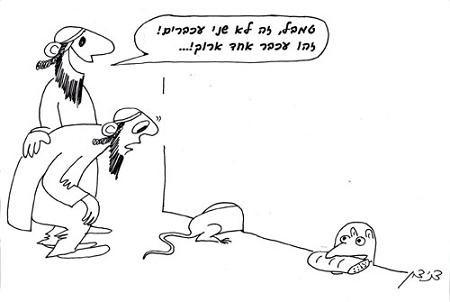
The gemara asks the question: A mouse enters with a piece of bread in its mouth and a mouse leaves with a piece of bread in its mouth. What is the rule?
May we conclude that the mouse which exited is the mouse which entered and therefore we do not have to check whether the house is free of leaven a second time? Or do we consider that the mouse which exited is a different mouse and that there is a chance the mouse which entered left a bit of leaven in the house, requiring us to check the house once again?
A secondary, related issue: What is the rule if a white mouse enters the house bearing bread and a black mouse exits the house bearing a piece of bread? It is now completely clear that this is a different mouse, and it would seem that we must check the house again unless we argue that the black mouse grabbed the bread from the white mouse and exited the house with it. If this is the case — there is no need to check the house again.
Another issue: Let us suppose that mice of the same species and family do not customarily snatch bread form each other. What is the rule is a mouse enters the house with bread in its mouth and a rat exits with bread in its mouth? Is this bread which the rat snatched from the mouse, and so we do not need to check the house again? But were this the bread that had previously been in the mouse’s mouth, we should have also seen the mouse in the rat’s mouth (for that is the way of rats), so perhaps we should suppose that this is a different piece of bread and we must check once again. But maybe the reason that the mouse is not in the rat’s bite and we see only the bread is that the mouse saw the rat and was startled, dropped the bread and ran.
We will note that the Talmud leaves these speculations unsettled and open.
(Babylonian Talmud, Tractate Pesachim 10b)
